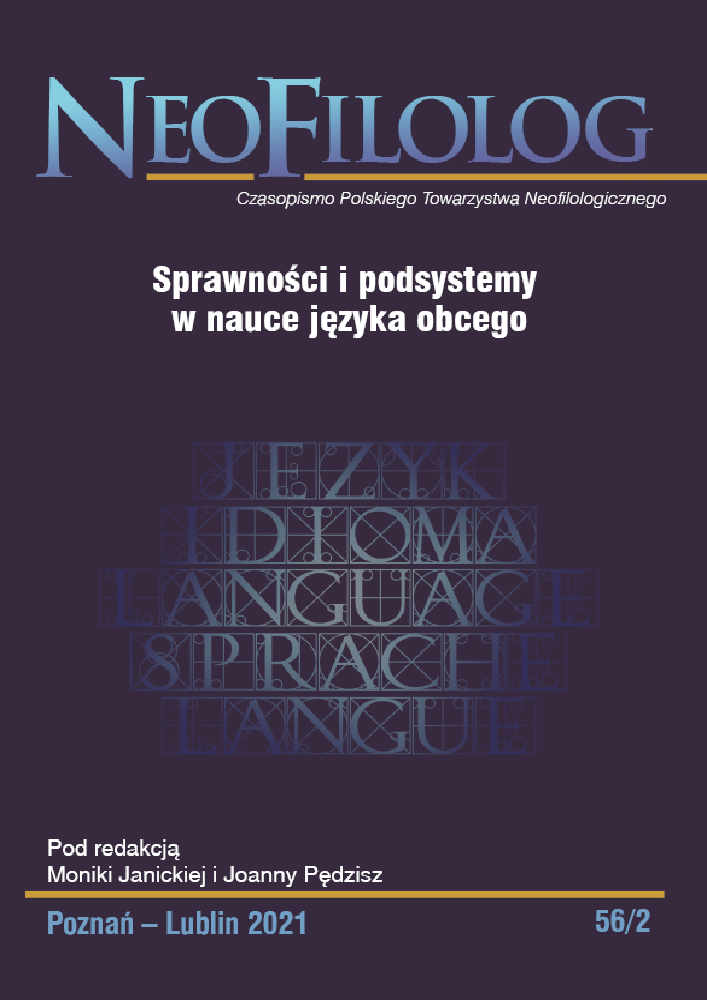Abstrakt
The article presents a study conducted on 27 university students and 5 of their teachers in the Winter semester 2020/21. The study was conducted because of recommended online teaching at Polish universities and almost four decades after the first TED event, when the TED community has become worldwide and the recordings of the events can be accessed online cost-free by anybody. The popularity of TEDs and the need to teach online prompted the author to incorporate it in teaching practice and review research literature from the areas of SLA (Second Language Acquisition), EFL (English as a Foreign Language) teaching and learning, socio-constructivism and adult learning. Based on this review, a hypothesis was formulated: TED talks support the development of listening, speaking, and interaction skills when used as a supplementary resource in teaching English as a foreign language to university students. Three supplementary questions were formed to test the hypothesis. Data was obtained in an online questionnaire and analysed using the qualitative data analysis framework of Miles and Huberman (1994). The study confirmed the hypothesis. Lessons with TEDs are valued as varied, interesting, inspiring and supporting oral communication skills’ development. Results are discussed, conclusions drawn and further research explored.
Bibliografia
Aleksandrzak M. (2018), Rozwijanie sprawności mówienia w kształceniu neofilologicznym z perspektywy studentów uczących się języka angielskiego jako obcego. Badanie jakościowe. Poznan: Wydawnictwo Naukowe UAM.
Bandura A. (1971), Social Learning Theory. New York City: General Learning Corporation. Online: https://web.archive.org/web/20131024214846/http://www.jku.at/org/content/e54521/e54528/e54529/e178059/Bandura_SocialLearningTheory_ger.pdf [DW 13.01.2021]
British Council & BBC World Service (2021), Communicative approach. Onli-ne: https://www.teachingenglish.org.uk/article/communicative-approach [DW 13.01.2021]
Council of Europe (2020), Common European Framework of Reference for Lan-guages: Learning, teaching, assessment – Companion volume, Council of Europe Publishing, Strasbourg, Online: https://www.coe.int/lang-cefr [DW 13.01.2021]
Ellis R. (2008), Principles of Instructed Second Language Acquisition. CAL Digest, December 2008. Online: Ellis, R. (2008) Principles of Instructed Second Language Acquisition [Language Learning].pdf [DW 13.01.2021]
European University Association (2020), COVID-19 and universities. Online: https://www.eua.eu/issues/27:covid-19-and-universities-in-europe.html [DW 13.01.2021]
Instytucja PAN (2021), The Code of Ethics for Research Workers. Online: https://instytucja.pan.pl/index.php/kodeks-etyki-pracownika-naukowego?jjj=1611685422342 [DW 13.01.2021]
Jaroszewska A. (2020), Studium przypadku w badaniach glottodydaktycz-nych. „Neofilolog”, Nr 54/2, 245–268. Online: https://pressto.amu.edu.pl/index.php/n/article/view/23404/22055 [DW 13.01.2021]
Jaworska M. (2020), Wyznaczniki profesjonalizmu nauczyciela – dyskusja glottodydaktyczna a polityka i praktyka oświatowa. „Neofilolog”, Nr 55/1, 51–73. Online: http://dx.doi.org/10.14746/n.2020.55.1.4 [DW 21.01.2021]
Knowles M. (1973), The adult learner: A neglected species. Houston: Gulf Publishing Company.
Komorowska H. (2009), Metodyka Nauczania Języków Obcych. Warszawa: Fraszka Edukacyjna.
Komorowska H. (2019), Ocenianie w Nauczaniu Języków Obcych. Fakty, mity i trudności. „Neofilolog”, Nr 53/2, 153–170. Online: https://pressto.amu.edu.pl/index.php/n/article/view/20579/20074 [DW 13.01.2021]
Kozinska K. (2013), Supporting lifelong learning with Open Educational Re-sources (OER) among diverse users: motivations for and approaches to learning with different OER. PhD thesis The Open University. Online: http://oro.open.ac.uk/40290/ [DW 06.01.2021]
Krashen S. (2013), The Compelling (and not just interesting) Hypothesis. Online: http://www.sdkrashen.co/onten/rticle/he_compelling_input_hypothesis.pdfGoogle Scholar [DW 22.01.2021]
Lantolf J., Thorne S. L., Poehner M. (2015). Sociocultural Theory and Second Language Development. In B. van Patten & J. Williams (Eds.), Theories in Second Language Acquisition (207–226). New York: Routledge. Online: https://www.researchgate.net/publication/313795407_Lantolf_J_Thorne_S_L_Poehner_M_2015_Sociocultural_Theory_and_Second_Language_Development_In_B_van_Patten_J_Williams_Eds_Theories_in_Second_Language_Acquisition_pp_207-226_New_York_Routledge [DW 19.03.2021]
Lindeman E. (1926), The Meaning of Adult Education. New York: New Republic, Inc.
McKinley J. (2015), Critical Argument and Writer Identity: Social Constructiv-ism as a Theoretical Framework for EFL Academic Writing. Online: https://doi.org/10.1080/15427587.2015.1060558 [DW 19.03.2021]
Miles M., Huberman A. (1994), An Expanded Sourcebook. Qualitative Data Analysis.2nd ed. London: Sage.
Paivio A. (2006), Dual Coding Theory and Education. Draft chapter for the conference on “Pathways to Literacy Achievement for High Poverty Children,” The University of Michigan School of Education, September 29–October 1, 2006. Online: https://neuropedagogie.com/images/pdf/paivio.pdf [DW 06.01.2021]
Patrick R. (2019), Comprehensible Input and Krashen’s theory. „Journal of Classics Teaching”, 20(39), 37–44. Online: https://www.cambridge.org/core/journals/journal-of-classics-teaching/article/comprehensible-input-and-krashens-theory/2308987050E8D31E3986B530D4B02F6F [DW 22.01.2021]
Punch K. (2005), Introduction to Social Research – Quantitative and Qualita-tive Approaches. London: Sage.
Richards J., Rogers T. (2001), Approaches and Methods in Language Teach-ing. Cambridge University Press: Cambridge.
Rose H., Galloway N. (2019). Global Englishes for Language Teaching. Cam-bridge: Cambridge University Press.
Serwis Rzeczypospolitej Polskiej (2020), Od 9 do 29 listopada – konieczne maksymalne przejście na naukę i pracę zdalną w uczelniach. Online: https://www.gov.pl/web/edukacja-i-nauka/od-9-do-29-listopada-konieczne-maksymalne-przejscie-na-nauke-i-prace-zdalna-w-uczelniach [DW 05.01.2021]
Swan M. (2005), Legislation by Hypothesis: the case of task-based instruction. „Applied Linguistics”, 26/3, 376–401. Online: doi:10.1093/applin/ami013 [DW 21.01.2021]
TED Conferences LLC (2021), TED Ideas worth spreading. Online: https://www.ted.com/ [DW 13.01.2021]
The University of Oxford (2020), Oxford podcasts. Online: https://podcasts.ox.ac.uk/open [DW 13.01.2021]
World Health Organization (2021), Coronavirus disease (COVID-19) pan-demic. Online: https://www.who.int/emergencies/diseases/novel-coronavirus-2019?adgroupsurvey={adgroupsurvey}&gclid=Cj0KCQiA0fr_BRDaARIsAABw4EtUyKL6zoiYKBP8k3cq05Vh5CEoATbX-q9sVYHrHHCehtbSuQ6YEqAaAqZgEALw_wcB [DW 13.01.2021]
Vygotsky L. (1978), Mind in Society. The Development of Higher Psychological Processes, Cambridge, MA: Harvard University Press.
Wiśniewska D. (2013), Interest and interest-enhancing strategies of adoles-cent EFL learners. „EFL Journal”, 67/2, 210–219.
NETOGRAPHY
https://bre.eltkeynote.com [DW 13.01.2021]
https://www.khanacademy.org/ [DW 13.01.2021]
https://www.microsoft.com/pl-pl/microsoft-teams/group-chat-software [DW 13.01.2021]
https://elt.oup.com/teachersclub/subjects/businessenglish/?cc=pl&selLangu age=pl [DW 13.01.2021)
http://www.uwm.edu.pl/badania/komisja-etyki/dokumenty [DW 13.01.2021]
https://www.youtube.com [DW 13.01.2021]
Licencja
Prawa autorskie (c) 2021 Katarzyna Kozińska

Utwór dostępny jest na licencji Creative Commons Uznanie autorstwa – Bez utworów zależnych 4.0 Międzynarodowe.
Przedstawiany utwór (artykuł) upubliczniany jest na podstawie umowy z autorem i na licencji Creative Commons Attribution-NoDerivatives 4.0 International (CC BY-ND 4.0).
Użytkownicy mają obowiązek podania wraz z rozpowszechnionym utworem, informacji o autorstwie, tytule, źródle (odnośniki do oryginalnego utworu, DOI) oraz samej licencji;
- bez tworzenia utworów zależnych,
- utwór musi być zachowany w oryginalnej postaci.
Uniwersytet im. Adama Mickiewicza w Poznaniu zachowuje prawo do czasopisma jako całości (układ, forma graficzna, tytuł, projekt okładki, logo itp.).

